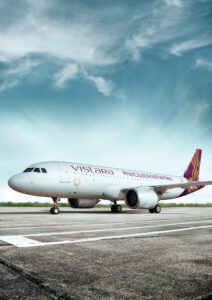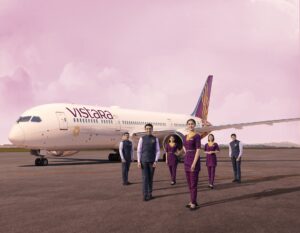Vistara Airlines brings together Tata’s and SIA’s legendary hospitality and renowned service excellence to offer the finest full-service flying experience in India. Vistara commenced its commercial operations on January 9, 2015, to set new standards in the Aviation industry in India and it today connects destinations across India and abroad.
In an interview with Deepak Rajawat, Chief Commercial Officer of Vistara; he shares insights about Vistara with our Travelogy.

Deepak has been with Vistara since its inception and has held several leadership roles in Corporate Planning, Aircraft Acquisition and Finance functions. In his previous role as the Head of Corporate Planning & Finance at Vistara, Deepak led departments such as aircraft acquisition & financing, corporate planning & strategy, finance & accounts, and taxation & compliance.
How has customer behaviour changed over the two years of Covid-19?
While the pandemic has conceived several new travel trends that are impacting customer behaviour, one significant behavioural change has been the rapid adoption of technology. We have witnessed a significant increase in web check-ins in the past 2 years, which also makes ground operations significantly more efficient for airlines. People are also increasingly adopting online, self-service tools for end-to-end transactions including the booking of ancillary services, etc.
In terms of flying behaviour, we are observing a growing preference for long haul direct flights to avoid the risk of infections and deal with constantly evolving guidelines at various destinations, especially internationally. Our flights to London, Frankfurt and Paris continue to perform well, establishing that the trend is likely to stay for the foreseeable future.
How has your strategy changed from pre-pandemic aspirations?
In a larger context, our strategy was focused on densifying our domestic network while expanding our international network across continents. Despite the challenges posed by the pandemic, we continue to stay firm on our long-term expansion strategy. We see immense potential for long-haul direct flights from India, and therefore, have remained focused on growing our global footprint even during the COVID-19 crisis. As we evaluate viable options to further grow our global network, we continue to invest in expanding our fleet and network. We are also investing significantly into several tech-enabled processes to further enhance the customers’ journey with us while improving overall efficiency in our processes.
How can airlines build greater resilience to survive future challenges?
Though the pandemic has had a devastating impact on all players in the aviation industry, it has also brought us all to an inflection point. Drawing from our own experience at Vistara, we can convincingly say that agility is one of the most important survival tactics in any challenging situation. Airlines that managed the worst of times with agility and ‘timely’ smart solutions have been able to withstand the toughest of times.
It is very important to be able to adapt to the evolving operating environment quickly and the pandemic has been a stark reminder of this. We are staring at some fundamental changes in almost every aspect of airline operations in the present day, and some may even be permanent. These include the growing preference for non-stop, direct connectivity especially on long haul routes; use of advanced technologies to remove the dependence on human interactions, extensive focus on safety and hygiene standards, etc. As an industry, we have seen how consumer habits have rapidly changed over the last few years, and they will certainly continue to evolve. I feel airlines, airports, and all key stakeholders in the ecosystem need to collectively think about the future of consumer behaviour and accordingly find innovative solutions to problems that we can pre-empt in our journey ahead. Growth plans, systems, and processes, all need to be revisited from a fresh perspective for realignment, and of course, digital transformation of systems and processes will need to run at a glacial pace.

At Vistara, we have always focused on staying nimble in our approach and it has worked for us. It is perhaps the reason we were able to manage reasonably well in the last two years despite the challenges of the pandemic. We could protect all jobs at Vistara, while continuing to grow our fleet and network (both domestic and international) and explore new opportunities such as commercial cargo, charter flights, and introduced many new ancillary services, etc. Our nimbleness helped us quickly adapt and seize opportunities.
What are your plans in terms of destinations and capacity expansion in the international and domestic markets?
Vistara was born to be a world-class airline from India, and all our efforts have been directed towards that end. Concerning the domestic network, we are continuously monitoring the market and evaluating various opportunities to expand our footprint. We recently announced the addition of Coimbatore as the 31st destination in our domestic network, and we have done it in a significant way. We are starting services to Coimbatore from three cities in India – Delhi, Mumbai, and Bengaluru, starting 20 May, 27 May and 03 June 2022 respectively. Additionally, we have also introduced several new routes like Mumbai-Srinagar and Bengaluru-Indore in the last four months. Talking about our international operations, we had forayed into global skies in August 2019 and launched five international destinations in quick succession. While the pandemic did slow down our pace temporarily, we soon managed to expand our network and launched connectivity to 11 international destinations including Dubai, London (Heathrow), Dhaka, Doha, Frankfurt, Sharjah, Malé, Paris, Singapore, Colombo and Kathmandu under the air bubble agreements. Since the resumption of scheduled international operations on 27 March 2022, we are operating flights to and from nine international destinations including Paris, Frankfurt, London, Kathmandu, Singapore, Dubai, Dhaka, Colombo, and Bangkok. We are scaling up our frequency on several routes, including Delhi-London and Mumbai-Singapore, to daily flights from May 2022.
What is the impact of rising fuel prices and other commodities on the airline, its operations and profit?
Aviation turbine fuel represents a major part of an airline’s operational cost base (~35-40% of the total cost), and fuel prices have significantly increased since the previous year owing to several reasons, including geopolitical tensions, the falling value of rupee against the dollar, etc. The increase comes as a challenge to the recovery of the industry as fuel prices and USD/INR movement have a direct impact on airlines’ bottom line.

Aside from environmental responsibility, what else do airlines need to do to attract the passenger of the future?
In the new normal, from the customers’ perspective, there is a high focus on safety, hygiene, and consistent experience across channels, and this is going to be one of the key considerations for a long time. At Vistara, we have taken several measures to ensure a safe flying experience for customers across all critical touchpoints. We incorporated a touchless check-in and arrival experience for all passengers while ensuring row-wise staggered boarding and deboarding of the aircraft. Scan & fly, self-tagging, self-baggage drop, self-boarding, e-gates, biometrics/face recognition, e-boarding passes, and bag tags are all touchless solutions that have been helpful in minimizing contact and making travel a safe experience for customers. Touchless customer services have seen significant enhancements and airlines need to invest in web/mobile/digital technologies that transform the way people travel. Airlines will also need to adopt cutting edge technologies such as AI, ML, Big data etc. to provide a customized and tailored travel experience. As a new-age, progressive airline, Vistara continues to be at the forefront of driving and adopting technological innovations to enhance the customers’ entire journey. Vistara is the first airline to have introduced touchless/paperless boarding at a few Indian airports two years ago.
Another key aspect will be to build upon operational excellence through automation interventions and process improvements, with the right balance of cost and value. Essentially, the focus needs to be to enhance value proposition while improving efficiency in operations.
What technologies particularly excite you, whether it is for serving the customer or improving operations?
Several new technologies such as blockchain, AI (artificial intelligence), ML (machine learning), Big Data etc. are reshaping airline operations today. Technologies like AI and Big data are particularly instrumental in driving data-backed decisions and delivering a personalised travelling experience to the customers. As an airline that is committed to providing an unmatched flying experience, we continue to leverage them to maximize customer satisfaction.
What are your views on Tata Group’s Acquisition of Air India?
It is great to see Air India find a home in the Tata group, and we believe it is a positive development for the entire aviation industry in India. For Vistara, we continue to operate as an independent airline and both our parent companies remain invested in our growth and expansion plans.







